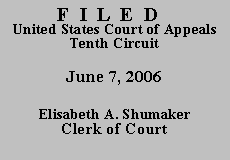

| ROBERT PETT; CHARLES A.
SCHULTZ,
Plaintiffs-Appellants, v. JAMES DUDZINSKI; STEVE IVIE, Defendants-Appellees. |
|
On appeal, plaintiffs argue that (1) the district court erred in granting defendants' motions for judgment on the pleadings and summary judgment, contending specifically that the district court ignored controlling law when it found defendants eligible for qualified immunity; (2) the district court ignored undisputed facts, improperly made factual findings, and wrongly viewed all factual disputes in the light most favorable to the movant defendants; and (3) the district court improperly denied their motion to alter or amend the judgment.
We review a dismissal based on judgment on the pleadings de novo. See McHenry v. Utah Valley Hosp., 927 F.2d 1125, 1126 (10th Cir. 1991).
We also review the district court's grant of summary judgment de novo and apply special rules in cases such as this where defendants assert qualified immunity in their motion for summary judgment. Taylor v. Meacham, 82 F.3d 1556, 1559 (10th Cir. 1996). The initial inquiry is whether plaintiffs have asserted the violation of a constitutional right at all. Id. Only if plaintiffs have done so does it become necessary for the court to determine whether that identified right was clearly established at the relevant time. Id. Here, plaintiffs fail to establish a constitutional violation.
Plaintiffs do not dispute that the affidavit, taken on its face, established probable cause for their arrests. They claim, however, that relevant information in the affidavit was false and that defendants are responsible for the inclusion of the falsehoods. To establish this constitutional violation, plaintiffs are required to present evidence tending to show that defendants "knew that the challenged information was false or that [they] had a reckless disregard for its truthfulness." Beard v. City of Northglenn, 24 F.3d 110, 114 (10th Cir. 1994). Plaintiffs presented no such evidence.
Contrary to plaintiffs' focus on appeal, this case is not about whether the State could prove an arson charge; it is about whether there is evidence that defendants deliberately falsified the affidavit or were reckless about whether the statements in the affidavit were true. Keeping this focus in mind, and having reviewed the record and decision of the district court de novo, we affirm the grant of qualified immunity to defendants for substantially the same reasons articulated by the district court.
Turning to plaintiffs' motion to alter or amend the judgment filed under Fed. R. Civ. P. 59(e) and 60(b), we agree with defendants that the district court did not abuse its discretion in denying the motion. See Servants of the Paraclete v. Does, 204 F.3d 1005, 1009 (10th Cir. 2000). Plaintiffs failed to identify any intervening change in the applicable law, bring forth new evidence unavailable at the time of the original decision, or show that granting the motion was necessary to correct clear error or to prevent manifest injustice. See id. at 1012.
Plaintiffs' motion to file a supplemental appendix is DENIED. Defendant Ivie's request for costs on appeal is GRANTED. Although in his request for costs Mr. Ivie wrongly charges plaintiffs with failing to include his memorandum in support of his motion for summary judgement in the appendix, see Aplt. Appx. at 229, we note that "costs are taxed against the [unsuccessful] appellant[s]" as a matter of course under Fed. R. App. P. 39(a)(2). The judgment of the district court is AFFIRMED.
Entered for the Court
Circuit Judge
*. After examining the briefs and appellate record, this panel has determined unanimously that oral argument would not materially assist the determination of this appeal. See Fed. R. App. P. 34(a)(2); 10th Cir. R. 34.1(G). The case is therefore ordered submitted without oral argument. This order and judgment is not binding precedent, except under the doctrines of law of the case, res judicata, and collateral estoppel. The court generally disfavors the citation of orders and judgments; nevertheless, an order and judgment may be cited under the terms and conditions of 10th Cir. R. 36.3.